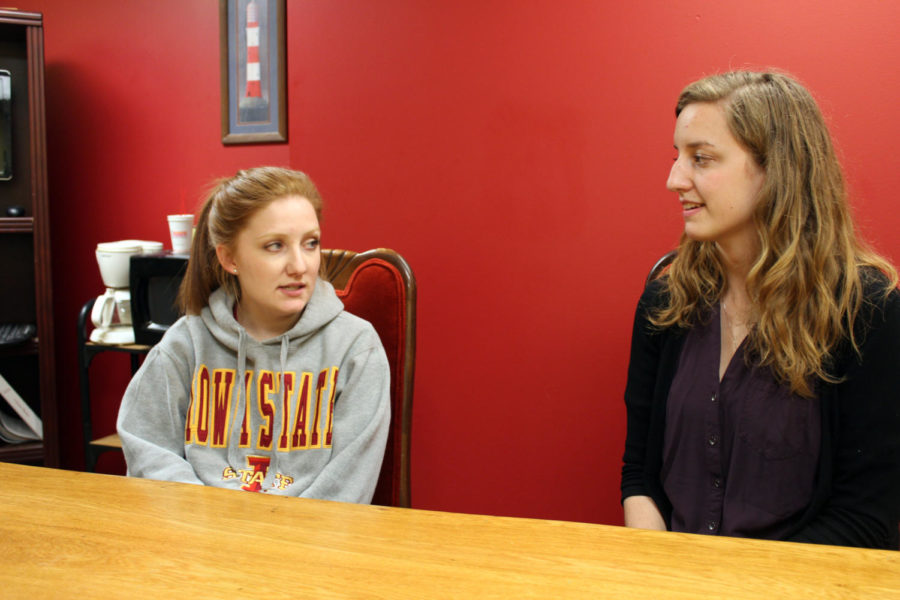Preparation, planning required for Veishea week
Photo: Lindsay Kayser/Iowa State Daily
Hilary Morris and Racheal Owens, co-presidents for Veishea, say that this year’s Veishea was in the planning process before last year’s was over. There is a committee where students can get involved in if they would like to help in the planning process. If they do not have time for a full-year commitment they can sign up for Veishea Corps, where they help out the week of Veishea.
April 14, 2013
With thousands set to congregate in Ames for Veishea week, extensive preparation is needed to ensure the much-anticipated events run smoothly and campus is properly maintained.
Given the stature of such a large-scale event, planning and preparation is a constant process. When one Veishea ends, work for the next begins shortly thereafter.
“There’s actually a little bit of overlap,” said Hilary Morris, a senior in agricultural business and co-chairwoman for the 2013 Veishea executive board.
“Rachel and I will be doing interviews before [this year’s] Veishea to try to select next year’s general co-chairs. We really kind of start preparing for [next year’s] Veishea before this year’s Veishea,” Morris said, referring to Rachel Owen, senior in global resource systems and fellow Veishea co-chairwoman.
A large portion of the preparation involves taking care of logistical necessities that include “tables, chairs, tents, bleachers, electricity and waste disposal; lots of those sorts of things,” Owen said.
Tasks of this nature are relegated to the Veishea operations committee who works in conjunction with Iowa State Facilities, Planning and Management.
“Veishea and FPM work together very closely for all events that go on. We schedule numerous meetings with them before Veishea to go over tent layouts, electrical hookups and supply requests for the countless number of Veishea traditions,” said Sam Showalter, operations committee co-chairperson.
The assistance Facilities Planning and Management provides is essential in carrying out Veishea events on a yearly basis.
“In my opinion, Veishea would not go on without the work of the FPM team,” Showalter said.
The operations committee, nicknamed the “backbone” per Showalter, cannot be in all places at once, however, “so we have Veishea corps members,” Owen noted.
Corps members play a significant role during the week of Veishea.
“Usually, there’s about 200 corps members and they help with the day-to-day functions of Veishea,” Owen continued.
From assisting with parade routes to helping run various tournaments, corps members can be spotted all over campus during Veishea week and act as a valuable aid to the executive committee.
Joining the Veishea corps, an opportunity now past deadline for this year’s Veishea, can provide students with a way to help without taking on the responsibility of a leadership role.
“Corps is a good way to get involved if you want to be involved during the week of Veishea if you don’t have the time to commit to the rest of the year,” Morris said.
Between overseeing the aforementioned corps members and numerous executive committees and maintaining constant contact with university officials, a sense of chaos could be expected at the executive level in regard to planning a large-scale event like Veishea.
Such is not the case for Owen and Morris, as strong communication with both the university and fellow Veishea team members has proved beneficial in preparation up to this point.
“The biggest thing is communication. We have constant contact with different university officials for different things on campus, so that’s one of the biggest things — to stay organized with things happening,” Morris said.
This is not to say that getting campus ready for the mid-April event is a breeze.
“At times I think it’s a little hectic, but we also have a really good team of people this year. We can give them responsibilities and turn them loose and not have to worry about them too much,” Morris added.
Owen agrees in her assessment of the planning process.
“It never gets too hectic; we’re usually prepared for the chaos.”















